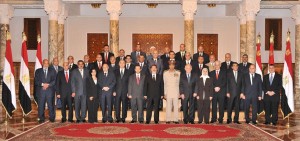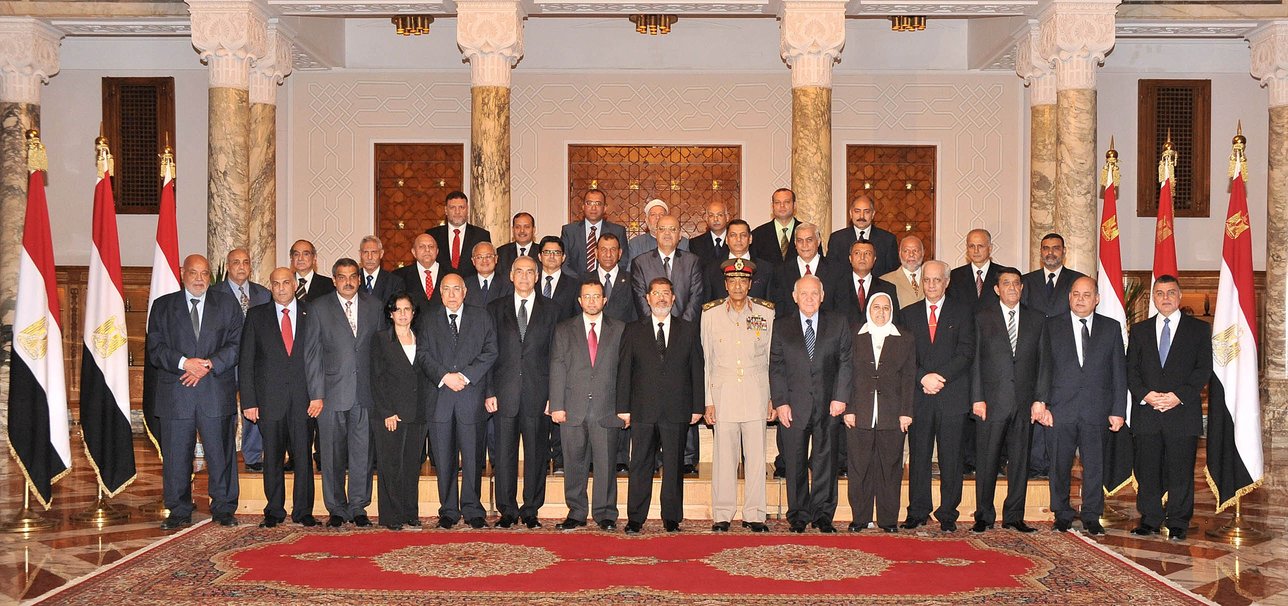
This article is part one of a series that examines the composition of the Qandil cabinet with a close look at allegiances and alliances within
President Mohamed Morsy promised a technocratic cabinet without a majority coming from the Muslim Brotherhood, and for the most part, he delivered.
There are only five members of the Muslim Brotherhood in the new cabinet, three of which are members in the group’s political wing, the Freedom and Justice Party.
FJP Assistant Secretary General Osama Yassin, who was chairman of the youth committee in the now dissolved People’s Assembly, has been named as Minister of State for Youth.
Tarek Wafik, head of the FJP’s internal housing committee was named Minister of Housing and Urban Development while party member and trade unionist Khaled El-Azhary was made Minister of Manpower and Immigration.
Mostafa Mosaad, who was responsible for the education section in Morsy’s electoral programme the Renaissance Project, was appointed Minister of Higher Education.
The influential Ministry of Information went to Salah Abdel-Maqsoud, a member of the journalists’ syndicate board and Muslim Brotherhood member. Abdel-Maqsoud was editor of several Islamist publications and now writes columns for the Muslim Brotherhood official website. He is the brother of the group’s lawyer Abdel-Moneim Abdel-Maqsoud.
At a glance it may seem like Morsy passed up on appointing members of his Freedom and Justice Party, the Muslim Brotherhood’s political wing, to influential or important posts, with the exception of the Abdel-Maqsoud appointment which places direct control over state television and radio with the Brotherhood.
The group has been having trouble with state media recently, with Brotherhood General Guide Mohamed Badie filing a lawsuit (through Abdel-Maqsoud’s brother Abdel-Moniem) against the former Minister of Information, Ahmed Anis (a retired general) for allegedly publishing false news and libel about the Brotherhood and Badie personally.
However, a closer look at which portfolios the group chose reveal they have indeed chosen wisely. Youth minister Osama Yassin is known to be a fast rising cadre within the party, with reports suggesting he may even be promoted to FJP Secretary General, the party’s second most important post. Yassin being handed the youth ministry means the Brotherhood will now have access to the thousands of youth centres across the country.
If he were to play his cards right, Yassin can improve the current youth facilities, create new ones and win over the youth, who generally do not favour the Brotherhood. Furthermore, Yassin could be used as a valuable recruitment method. If the Brotherhood shows it cares for the youth and improves their lives, many more might be more inclined to join.
The creation of a new, separate sports ministry for the first time is not a coincidence. Any youth and sports minister would have to deal with a plethora of controversial issues like whether or not to bring back the football league, if the games would be played with audience or without, stadium security, the ultras.
Splitting the ministry allows Yassin to appear successful without handling those impossible issues, which are now left to the new sports minister, Al-Ahly club board member El Amry Farouk. Farouk ran for a seat in the 2010 parliamentary elections on behalf of the disbanded former ruling National Democratic Party.
The appointment of an FJP member to the manpower ministry comes as no surprise either. The party is known for its opposition to the growing labour movement in Egypt after the toppling of former President Hosni Mubarak.
This month, two senior Brotherhood officials described strikes and protests in front of the presidential palace as “factional demands” that are part of a plot to destabilise the country and make Morsy look bad.
Being in charge of the manpower ministry will allow the group to enact legislation and take decisions limiting such strikes and generally weakening the labour movement and the new trend of independent workers’ unions and syndicates.
The higher education ministry allows the Brotherhood control over public universities, home to most of the revolutionary youth. While outright propaganda is unlikely to be accepted, this ministry allows the Brotherhood to keep tabs on revolutionary youth as well as control the internal running of Egyptian universities. Eyes will be on any increases in and promotions of Muslim Brotherhood aligned professors.
In addition to the five Muslim Brotherhood ministers, the cabinet also includes two members who are not members of the group but could be seen as their allies.
The Minister of State for Legal and Parliamentary Affairs, Mohamed Mahsoub, is a member of the moderate Islamist Wasat Party. His job would be to function as a link between the cabinet and the legislative branch, including the Constituent Assembly tasked with drafting Egypt’s new constitution, of which he is also a member.
The new Minister of Justice Ahmed Mekki, a former deputy chairman of the cassation court, is known for being a pillar of the independent judiciary movement and his opposition to the Mubarak regime. Although he is an independent, Mekki is also seen as being sympathetic to the Brotherhood.
He supported Morsy’s decision to bring back parliament and accused the Supreme Constitutional Court judges of politically motivated verdicts. When asked if he were a member of the group, Mekki told the press he did not “have the honour” of being a member.
Having the justice minister on their side allows the Brotherhood to perhaps solve their recurring problems with Egypt’s judiciary. The group has been at odds lately with the Supreme Constitutional Court and the administrative judiciary over the constituent assembly, dissolution of parliament, and constitutional decrees.



